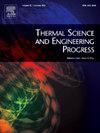Research on financial optimization of automatic production process in intelligent manufacturing factory based on cloud computing and thermal energy consumption optimization
IF 5.1
3区 工程技术
Q2 ENERGY & FUELS
引用次数: 0
Abstract
Under the current wave of Industry 4.0, the automated production process of smart manufacturing plants is becoming increasingly complex and efficient. The increasing proportion of heat consumption in the production process has become an important factor affecting production costs and environmental sustainability. This paper aims to explore how to realize the financial optimization of automatic production process of intelligent manufacturing plant by combining cloud computing technology with thermal energy consumption optimization strategy. This paper introduces the background of automatic production processes in intelligent manufacturing plants, and expounds the importance and current challenges of thermal energy consumption in them. The research focuses on how to use the powerful computing power and big data analysis capabilities of cloud computing platforms to monitor and manage heat consumption in real time. The cloud computing platform will serve as the core of data processing and analysis, supporting large-scale data storage, processing and analysis tasks. The thermal management system is responsible for collecting heat usage data in the production process and analyzing it through the cloud computing platform. By establishing a heat consumption model, the heat demand under different production conditions is predicted, so as to achieve accurate supply and optimal distribution of heat energy. The results of the study will show that by implementing cloud computing and thermal optimization strategies, the thermal energy consumption of smart manufacturing plants is significantly reduced, and the production cost is also reduced, indicating that through cloud computing and thermal optimization strategies, not only financial optimization can be achieved, but also improve the environmental sustainability of smart manufacturing plants.
求助全文
约1分钟内获得全文
求助全文
来源期刊

Thermal Science and Engineering Progress
Chemical Engineering-Fluid Flow and Transfer Processes
CiteScore
7.20
自引率
10.40%
发文量
327
审稿时长
41 days
期刊介绍:
Thermal Science and Engineering Progress (TSEP) publishes original, high-quality research articles that span activities ranging from fundamental scientific research and discussion of the more controversial thermodynamic theories, to developments in thermal engineering that are in many instances examples of the way scientists and engineers are addressing the challenges facing a growing population – smart cities and global warming – maximising thermodynamic efficiencies and minimising all heat losses. It is intended that these will be of current relevance and interest to industry, academia and other practitioners. It is evident that many specialised journals in thermal and, to some extent, in fluid disciplines tend to focus on topics that can be classified as fundamental in nature, or are ‘applied’ and near-market. Thermal Science and Engineering Progress will bridge the gap between these two areas, allowing authors to make an easy choice, should they or a journal editor feel that their papers are ‘out of scope’ when considering other journals. The range of topics covered by Thermal Science and Engineering Progress addresses the rapid rate of development being made in thermal transfer processes as they affect traditional fields, and important growth in the topical research areas of aerospace, thermal biological and medical systems, electronics and nano-technologies, renewable energy systems, food production (including agriculture), and the need to minimise man-made thermal impacts on climate change. Review articles on appropriate topics for TSEP are encouraged, although until TSEP is fully established, these will be limited in number. Before submitting such articles, please contact one of the Editors, or a member of the Editorial Advisory Board with an outline of your proposal and your expertise in the area of your review.
 求助内容:
求助内容: 应助结果提醒方式:
应助结果提醒方式:


